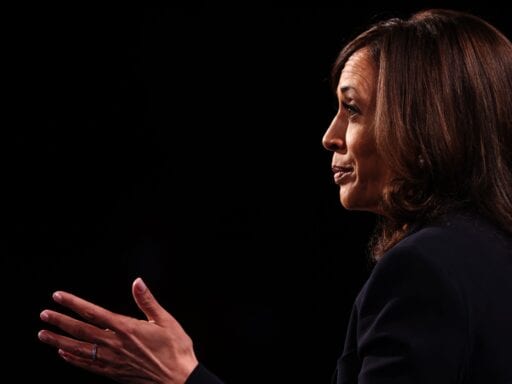Her debate performance didn’t go over well with a mostly male focus group of 13 undecided voters.
Polling expert Frank Luntz convened a focus group of undecided voters after Tuesday night’s vice presidential debate, and all but one of the participants declared Vice President Mike Pence the winner.
Nine of the 13 voters were men. But many of them, both women and men, described Pence in positive terms, such as “presidential,” and “calm, cool, and collected.” When asked to sum up Sen. Kamala Harris’s performance on the debate stage, however, the voters said she seemed “evasive,” “nervous,” “snarky,” “rehearsed,” “abrasive,” “unsteady,” “rigid,” and “unpresidential.”
Some partisans are often skeptical that the voters in such focus groups actually are “undecided.” Though America is more polarized than ever, a relatively small number of last-minute deciders could indeed swing the outcome of the election.
Pence dodged almost every question, instead deftly redirecting the conversation to Republican talking points on subjects ranging from religious freedom to support for law enforcement, and sought to falsely portray the president as a moderate. It was about as good of a performance as he could have delivered, considering that President Trump’s path to reelection appears to be narrowing, and the sentiments in the focus group reflected that.
Harris’s biggest success was in landing blows against the Trump administration’s botched response to the coronavirus pandemic. She evaded a question about whether a Biden administration would pack the Supreme Court with more justices — but unlike in Pence’s case, her attempt to change the subject raised a red flag in the focus group.
Several voters said they were frustrated that she didn’t answer the question.
“I didn’t really get answers,” John, an Ohio voter, said. “Packing the Supreme Court — these are all issues you want to know what they’re going to do. So, yes, it is very important to me.”
Another voter, Tom from Nevada, said he had an open mind about the candidates going into the debate, but Harris’s refusal to take a position on court-packing was a big reason he’s now leaning toward casting his ballot for Trump.
Both Democrats and Republicans have been pressuring the Biden campaign to take a stance on the subject of court-packing. But the disproportionate criticism of Harris’s attempt to evade the question suggests that, as the first woman of color on the debate stage in a general presidential election, sexism may have played a role.
Harris’s team had tried to prepare for the possibility that she would be perceived differently as a Black woman. They researched the trope of the “angry Black woman,” which, my colleague Li Zhou predicted, might be something that “media outlets and President Donald Trump may attempt to project onto the vice presidential candidate.” Trump, for his part, has called Harris “nasty” in the past in reference to her question of Supreme Court Justice Brett Kavanaugh during his confirmation hearings.
An Ohio voter named Kimberly, the lone Black woman in the group, pointed out the discrepancy in how the participants were talking about Harris as compared to Biden and Trump in another meeting after last week’s debate.
“I think we have to understand the difference of how we equate male and female,” she said. “Last week, we saw Mr. Biden and President Trump make all types of facial expressions and that was never an issue on last week’s call. Now that we have a woman, I believe that people are inadvertently looking at her a certain way.”
She added, “But as far as [whether she seemed presidential,] it all depends on who you’re asking and why you’re asking, especially when you’re asking males.”
Millions turn to Vox each month to understand what’s happening in the news, from the coronavirus crisis to a racial reckoning to what is, quite possibly, the most consequential presidential election of our lifetimes. Our mission has never been more vital than it is in this moment: to empower you through understanding. But our distinctive brand of explanatory journalism takes resources. Even when the economy and the news advertising market recovers, your support will be a critical part of sustaining our resource-intensive work. If you have already contributed, thank you. If you haven’t, please consider helping everyone make sense of an increasingly chaotic world: Contribute today from as little as $3.
Author: Nicole Narea
Read More



